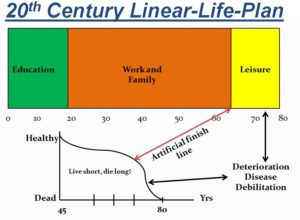Enough of this “Life Purpose” thing! Can’t We Get Over It?

Do me a favor. Google “life purpose.”
Go ahead – I’ll wait.
Did you come up with the same number I did: 5,680,000.

Is it really THAT important?
Some would say it’s in the “woo-woo”, “touchy-feely” category crafted to sell books, workshops, and coaching services.
Others would say it’s essential to a life well-lived.
I’ll go with the latter.
The former and latter are working well for Richard Leider, founder of Inventure – The Purpose Company. He’s written three books on the topic and is ranked by Forbes as one of the “Top 5” most respected executive coaches on the planet.
Influential Strategic Coach founder, Dan Sullivan, maintains that people die early for three reasons:
-
- No money
- No friends
- No purpose
Having coached over 18,000 successful entrepreneurs to success over 40+ years, Dan has observed the power of purpose and knows of what he speaks.
There must be something to it.
What is it anyway?
The University of Minnesota website Taking Charge of Your Health and Wellbeing describes it this way:
Purpose can guide life decisions, influence behavior, shape goals, offer a sense of direction, and create meaning. For some people, purpose is connected to vocation—meaningful, satisfying work. For others, their purpose lies in their responsibilities to their family or friends. Others seek meaning through spirituality or religious beliefs. Some people may find their purpose clearly expressed in all these aspects of life.
OK, if it’s that important, why do so few end up with one?

Approximately 45% of U.S. employees are not happy in their jobs, according to a 2019 survey by The Conference Board. Maybe building somebody else’s dream isn’t the most fertile ground for finding a life purpose.
Some find it there – many don’t.
In this era of Bernie, Elizabeth, Peter, and AOC, we seem to be thinking there’s hope in having it found for us. Just get in line – D.C has the solution to your angst.
Then again, maybe not.
This caption from P. 259 of the book “Younger Next Year” by co-author Dr. Henry Lodge unpacks some interesting insight into that solution (bolding is mine):
“After the collapse of the Soviet Union, enormous numbers of Russian men lost the only structure they had known. With nothing to replace it, many of them lost their sense of place, of belonging, of matter, of simply being needed or relevant to their families and to their society. What happened? Within just a few years, life expectancy for Russian men plummeted from sixty-four years to fifty-seven years. They died limbic deaths. Heart attack and cancer rates soared as did depression, alcoholism, suicide, accident and violent deaths – all cries of limbic agony. In some ways, what happened in Russia is happening to many of us in retirement, and it’s scary as hell.”
Hmmm – a forced sense of purpose doesn’t seem to have legs. And the loss, however shallow, is devastating.
We’re sandwiched in a no-sense-of-purpose system.
OK, I may be going off the rails here – please let me know if you think I am.
I’m thinking we lack a “front-end system” that comes anywhere close to broaching the topic of life purpose.
We’re plopped into a classroom with thirty others, told what to learn, how to learn within a system that hasn’t changed in a hundred years. Conformity is paramount, originality is often unrecognized, stifled.
Harry Chapin – the greatest troubadour ever – picked up on this and put it together in one of his greatest songs: “Flowers Are Red” – enjoy and ponder it here.
We carry the conformity forward into the 40-year phase of this 20th-century life-cycle model and getta job, getta wife, getta family, getta mortgage, fenced yard, 2 1/2 kids, two cars and a labrador retriever, getta title, getta 401K, and getta gold watch.
A sense of “life purpose” in there? Maybe – evidence says usually not.
Then we back-end it with a wrap-up system called retirement that’s fully encumbered with an 85-year-old process whose purpose is to move us out and into a purposeless life of leisure and self-indulgence.
And then we die young.
Lacking a beginning, middle, and end, life-purpose development doesn’t have much of a chance it seems. So we “live too short and die too long” in our society.

Oliver Wendell Holmes reminded us:
“Many people die with their music still in them. Too often it is because they are always getting ready to live. Before they know it time runs out.”
It’s not too late!
I’m encouraged. I believe we are beginning to see the emergence of a focus on “life purpose.” From this seat, it seems to be coming from those at the mid-life point – that uneasy time of tough questions (Why am I here? Does anybody care?); of waning career interest or opportunity; of empty-nesting; of a deepening sense of life’s finite nature; of a sense of not wanting to waste the acquired wisdom, skills, talents, and experiences on a cruise ship, beach, golf course or pickle-ball court.
Maybe even a sense of having better answers to the mess the country finds itself in.
We have the tools.
Permit me to link two phrases that we should be pondering in the face of the messiness around us:
“Life purpose” and “Active wisdom”
Unless terminally infected with the narcissism our current culture promotes, we are drawn to serve, to pass on what we know, to lighten a better path for those behind. It’s called “generativity.“ It seems to surface the drive for a life purpose.
It provides the “why.”
“Active wisdom” is a term coined by anthropologist, activist, and writer Mary Catherine Bateson. She calls it a “new stage” where “wisdom is reaped from years of experience and living.” She calls it the “most acceptable and positive trait associated with longevity.”
“Active wisdom” brings the “what.”
Not as I did.
I’ll be your poster-child for the wrong path. I drank the 20th-century Koolaid and barnacled-over my innate talents or any chance for life-purpose immersion for 6 1/2 decades.
But it came, gradually, grudgingly – slowly removing the last vestiges of conformity and the cultural expectations and beliefs that were in the way. It feels right to try to bring forward the mere modicum of my life’s accomplishments and acquired wisdom, season it with legions of mistakes, challenges, and trials and to share it as a light for somebody.
Is there certainty in it all? Not even.
But neither was there on the other path.

I’ll confirm that there’s lots of room on this “road less traveled” – and that the need is great.
Hop on – you’re wired to make a difference.
Your thoughts, criticisms, compliments, complaints all mean a lot. Leave any or all below or email me at gary@makeagingwork.com.
Also, if you haven’t, subscribe to this weekly newsletter at www.makeagingwork.com and receive a copy of my free ebook entitled “Achieve Your Full-Life Potential: Five Easy Steps to Living Longer, Healthier, and With More Purpose.”





Hey Gary, I think this explains so much about the unhappiness that is in our country. We tell each other how free we are, then we teach children like we are in a communist society. We need to help our young people figure what are their talents. We have all chosen careers based on salary instead of happiness
Gary, your points and Harry Chapin’s song remind me of what I learned from Rori O’Hara’s book, Hero Versus Heroin. She says the problem with education is it typically frustrates all the kids who are probably kinesthetic learners.
They can’t learn in the analytical environment Chapin describes. Additionally, they have to move in order to absorb information. Instead of teaching them in their natural learning style, they are forced to take ritalin or adderal (speed) so they zombie out, sit still and fit in.
I suspect, as does OHara, that in their effort to self-soothe, our institutions and greed have created the speed and heroin epidemics. Her book can be found on Amazon.
Want to add that it is very difficult for active addicts to discover and live their passion.
Thing I found is active addiction is no life. Once sober that becomes painfully obvious. Lots of time awake & asleep realising the full negative impact. Truth is no one can change what happened.
Thanks Gary! Made me think of the poem The Dash with which yuo and your readers are undoubtedly aware of, but here goes anyway, posted from beautiful Cape Town, South Africa:
THE DASH
the poem by Linda Ellis
I read of a man who stood to speak at the funeral of a friend. He referred to the dates on the tombstone from the beginning… to the end.
He noted that first came the date of birth and spoke of the following date with tears, but he said what mattered most of all was the dash between those years.
For that dash represents all the time they spent alive on earth and now only those who loved them know what that little line is worth.
For it matters not, how much we own, the cars… the house… the cash. What matters is how we live and love and how we spend our dash.
So think about this long and hard; are there things you’d like to change? For you never know how much time is left that still can be rearranged.
To be less quick to anger and show appreciation more and love the people in our lives like we’ve never loved before.
If we treat each other with respect and more often wear a smile… remembering that this special dash might only last a little while.
So when your eulogy is being read, with your life’s actions to rehash, would you be proud of the things they say about how you lived your dash?
Time to pull out that old copy of “How to be a nonconformist” – published in 1968. See https://www.brainpickings.org/2013/09/30/how-to-be-a-nonconformist-elissa-jane-karg/
Interesting article – I guess I have been lucky to have a career I loved and continue to enjoy and that gave me purpose. It has been fun finding new areas of purpose as there are so many options. Life feels so full of opportunities and adventures.
Is being home ,retired and a caregiver for my husband a lack of talent , skills ? DO I need more in my life ? I’m among of 6 grown kids and grandmother of. 13 . I feel young yet 69 willing to goout in this world meet people do things have fun Husband disabilities and money prevent us from doing this
Can I just say what a relief to find someone who actually knows what theyre talking about on the internet. You definitely know how to bring an issue to light and make it important. More people need to read this and understand this side of the story. I cant believe youre not more popular because you definitely have the gift.
Hello makeagingwork.com administrator, Your posts are always well-received and appreciated.
Hi makeagingwork.com webmaster, You always provide practical solutions and recommendations.
Hi makeagingwork.com owner, Your posts are always well-delivered and engaging.
Merely a smiling visitant here to share the love (:, btw outstanding design and style.
Dear makeagingwork.com administrator, You always provide great information and insights.
To the makeagingwork.com admin, Your posts are always well-supported and evidence-based.